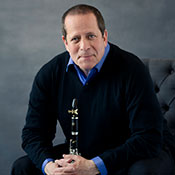
Concertmaster Jinwoo Lee Prepares for 2024.25 Season
David Lewellen
PUBLISHED
Tagged Under: 2024.25 Season, MSO Musicians, Violin
After one year as concertmaster of the Milwaukee Symphony Orchestra, Jinwoo Lee is easing into the role of a soloist.
Lee will perform his first concerto with the orchestra in January, taking center stage for Sibelius’s Violin Concerto in D minor. But in the MSO’s first subscription concert Sept. 27-29, he will have a hybrid role in Rimsky-Korsakov’s Scheherazade. The popular Russian score is an orchestral showpiece, but it also features several extensive solos for the first-chair violin.
Lee served as a concertmaster in Germany before he and his family moved to the United States in 2022; his wife is currently a doctoral student at the University of Maryland. He describes a learning curve for playing in an American orchestra, with a more compressed rehearsal schedule — four rehearsals for a classical concert instead of six. “There’s less time to explore or experiment,” he said. “If a bowing doesn’t work, it needs to be fixed right away.”
But, he continued, “My colleagues have been absolutely fantastic, so helpful and professional. With any new job, you learn along the way. I’m still learning, but for the most part, it’s been a blast.”
Associate concertmaster Jeanyi Kim, who usually sits directly behind Lee, praised his preparation. “He’s extremely conscientious and hard-working, and he’s always thinking about the conductor’s needs and also the section’s,” she said. “I respect that a lot. He’s really quiet and has a serious face, but getting to know him, he has a good sense of humor.”
“Every orchestra has an individual style, but I try to speak as little as possible and show as much as possible,” Lee said. And a string section is laid out so that the other first violins, sitting behind him, can watch his bow and take their cues from his body language. “Everyone has an upbringing of playing chamber music while they study. They’re used to playing with someone,” he said. “Most of the time, I say very little, because my colleagues are so aware, and they care. It’s made my job so easy.”
But there is a difference between asking the first violins to match his sound and playing by himself, which he will do a lot of in Scheherazade. “It’s a challenge for every piece I play,” he said. “What does it mean to me personally, plus how can I bring out everything the composer has written down?”
In the normal course of preparation, Lee has listened to many recordings of the piece, “and it’s quite remarkable how differently people play this work,” he said. “I try to paint the story as vividly as I can through my instrument, and it’s so wonderfully written that I don’t need to force a certain sound.”
The MSO will perform the program three times, and Lee says that his solos will be a little bit different each time, within the framework of the larger performance. There’s a limit to what he can do when the rest of the orchestra is playing, but “there’s always room for imagination, variety, spontaneity,” he said. “I can float and glide without Julia having to be on her toes,” referring to principal harpist Julia Coronelli, who is frequently the only accompaniment to the solo violin passages.
But looking ahead to his featured solo turn in January, Lee said, “Scheherazade still isn’t a concerto. I’m part of the orchestra and I return back to being the leader of the section.” When he takes on the Sibelius, he will be playing his favorite concerto. Referring to a great violinist of the 20th century, he said, “David Oistrakh said that it is ice and fire, which I totally agree with.”
Playing with his own orchestra, he said, will be a more comfortable experience than an ensemble he is meeting for the first time. And performing as a soloist in the Bradley Symphony Center is another experience to look forward to. “It’s a combination that’s hard to beat, playing with Ken and that orchestra in that hall,” he said. “It’s a very special opportunity, and it doesn’t come by every day.”



